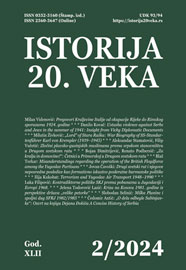KONTRADIKTORNE POLITIKE SKJ PREMA POBUNAMA U JUGOSLAVIJI I U EVROPI 1968.
CONTRADICTORY POLICIES OF THE LEAGUE OF COMMUNISTS OF YUGOSLAVIA TOWARDS THE REBELLIONS OF 1968 IN YUGOSLAVIA AND EUROPE
Author(s): Luka FilipovicSubject(s): History, Political history, Recent History (1900 till today), Post-War period (1950 - 1989)
Published by: Institut za savremenu istoriju, Beograd
Keywords: Student movements; Yugoslav secret service; University in Belgrade; democratic socialism; disidents; Josip Broz Tito
Summary/Abstract: Two decades after the end of WWII, both government and communist opposition parties of the Western Bloc countries found themselves facing social consequences of global political, economic and cultural changes that followed the introduction of “welfare state” policies in the Western Europe and USA. Rebellions at universities and creation of new political movements further destabilized already complex political situation in Western Bloc, while communist parties of Mediterranean started the long process of defining new party ideologies and braking away from the influence of Soviet Union. Meanwhile, unique historical and social circumstances of Yugoslavia, alnogside inter conflicts of Yugoslav communists during the construction of Yugoslav socialist model influenced new fractions of opposition and new formes of civil resistance against communist regime. League of Communists of Yugoslavia however, despite its constant promises of reforms such as democratization of public life, liberalization of the market and decentralization of state and party administration remained resiliant in its efforts to brake apart all forms of civil opposition and integrate them into the burocratic structures of communist party. During later famous student demonstrations of 1968, Yugoslav party leadership managed to, by various means, persuade the university movement to accept compromise with the state administration on the terms which indicated that many social and economic problems of Yugoslavia stated in the demands of Yugoslav students can only be discussed within the frame of communist party ideology. Later, LCY leadership proceeded to use secret sevice and police forces of Yugoslav state to conduct represive retributions against many known professors and student leaders, while at the same time providing political support to student and other opposition movements in coutries of both Western and Eastern Bloc, and substancial financial aid to those parties of European left who have, much like the large parts of Yugoslav civil resistance, defined their ideology as democratic socialism.
Journal: Istorija 20. veka
- Issue Year: 2024
- Issue No: 2
- Page Range: 433-452
- Page Count: 20
- Language: Serbian

